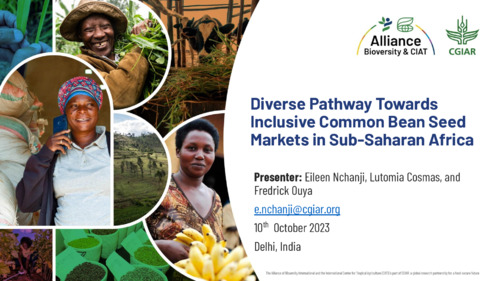Diverse Pathway Towards Inclusive Common Bean Seed Markets in Sub-Saharan Africa
Seed-systems development is crucial for enhancing agricultural productivity in sub-Saharan Africa, with a particular emphasis on inclusivity and prioritization of smallholder producers, especially women. Preliminary results from data collected in five countries in Eastern and Southern Africa reveal significant variations in seed producers’ participation in institutional innovations. Zimbabwe exhibits high rates of contract arrangements (97%) and partnerships (100%), while Burundi and DR Congo show the least involvement (7% and 24%, respectively). These differences affect farmers’ access to certified seed, seed production volumes, and market participation rates. However, gender-disaggregated results highlight potential disparities in the benefits of institutional solutions. On average, men tend to have higher participation rates in contract farming (49%) and partnerships (78%) compared to women (36% and 67%, respectively), potentially leading to gender disparities in market access. Although women farmers have a higher usage of improved seed (36%) compared to men (31%), a significantly higher percentage of men (79%) participate in the output market compared to women (71%). Furthermore, women are more likely to focus on bean farming for household food security using improved seed (45%), while men prioritize market-oriented seed production (25%). These findings emphasize the importance of considering local contexts when designing and implementing institutional innovations to address gender gaps in seed systems. Prioritizing gender inclusivity requires developing policies that promote equal representation and participation of women in institutional arrangements. By doing so, seed systems can be better tailored to meet the diverse needs and challenges of men and women farmers.

